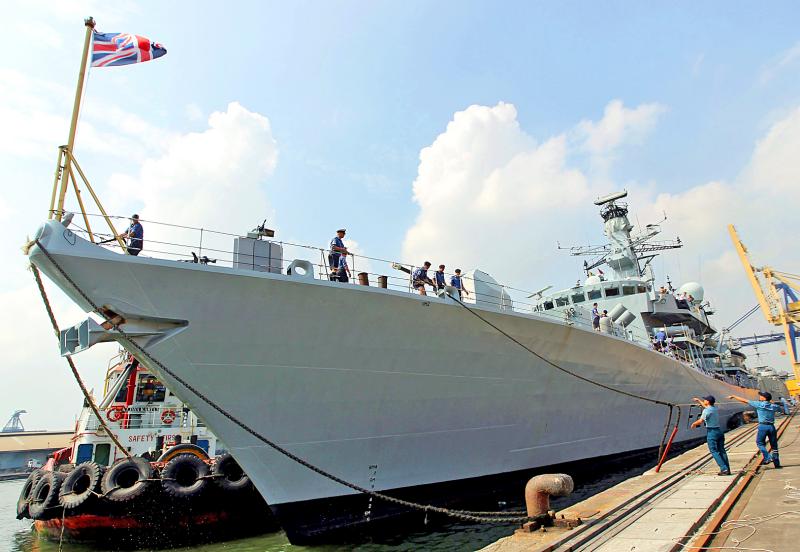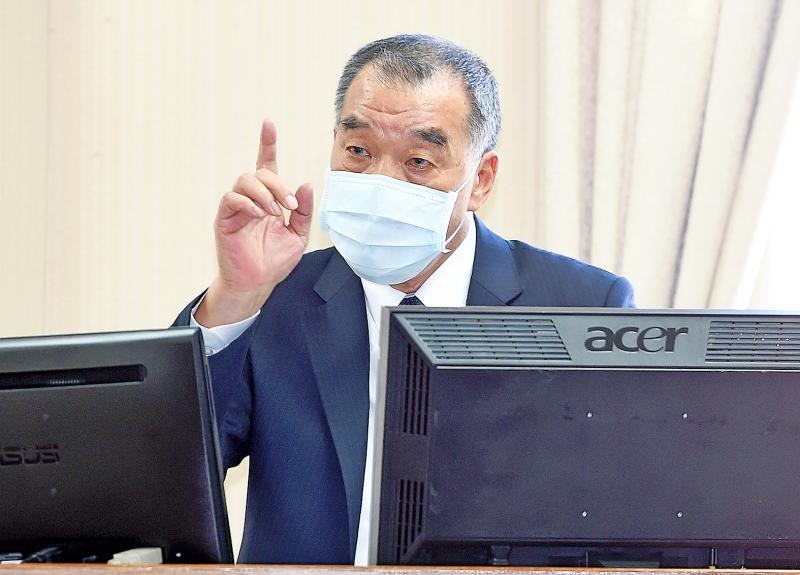British warship the HMS Richmond passed through the Taiwan Strait yesterday morning, according to a social media post from the frigate.
“After a busy period working with partners and allies in the East China Sea, we are now en route through the Taiwan Strait to visit Vietnam and the Vietnam People’s Navy,” the message on Twitter said.
The type 23 Royal Navy frigate is one of the ships deployed with the HMS Queen Elizabeth aircraft carrier and her task group on a global mission to visit more than 40 nations.

Photo: EPA
The aircraft carrier and task group earlier this month made a port call in Yokohama, Japan.
The British embassy in Tokyo said at the time that the deployment was “a powerful demonstration of the UK’s close and enduring partnership with Japan and the UK’s commitment to maritime security in the Indo-Pacific region.”
The passage through the Taiwan Strait came a week after British First Sea Lord Admiral Tony Radakin told Nikkei Asia that the Taiwan Strait is “international waters” and it can be used by any nation, not just by China.

Photo: Liao Chen-huei, Taipei Times
Minister of National Defense Minister Chiu Kuo-cheng (邱國正) said in Taipei that he was not aware of the exact mission of the British warship that was passing through the Taiwan Strait, but that the armed forces have a clear grasp of all foreign vessels operating near Taiwan and would not intervene.
In related news, Chiu yesterday told a meeting of the Foreign Affairs and National Defense Committee at the legislature that Taiwan needs long-range, accurate weapons to properly deter a China that is rapidly developing systems it could use to attack the nation.
The government this month proposed extra defense spending of almost US$9 billion over the next five years, including on new missiles, as it warned of an urgent need to upgrade the nation’s weapons in the face of a “severe threat” from China.
Taiwan needs to let China know that it can defend itself, Chiu said.
“The missiles must be long-range, precise and mobile, so that the enemy can sense that we are prepared as soon as they dispatch their troops,” he said.
In a written report to the legislature, the ministry said that both medium and long-range missiles were being used in intercept drills at a key testing facility on the southeastern coast.
Chiu declined to give details of the range of those missiles.
The ministry gave an unusually stark assessment of China’s abilities in its annual report, saying it could “paralyze” Taiwan’s defenses and is able to fully monitor its deployments.
It is important that Taiwanese are aware of the danger facing them, Chiu said.
Asked what China would attack first in the event of a war, Chiu said that it would be Taiwan’s command and communications abilities.
“On this the Chinese communists’ abilities have rapidly increased. They can disrupt our command, control, communications and intelligence systems, for example with fixed radar stations certainly the first to be attacked,” he said. “So we must be mobile and stealthy.”

CHAOS: Iranians took to the streets playing celebratory music after reports of Khamenei’s death on Saturday, while mourners also gathered in Tehran yesterday Iranian Supreme Leader Ayatollah Ali Khamenei was killed in a major attack on Iran launched by Israel and the US, throwing the future of the Islamic republic into doubt and raising the risk of regional instability. Iranian state television and the state-run IRNA news agency announced the 86-year-old’s death early yesterday. US President Donald Trump said it gave Iranians their “greatest chance” to “take back” their country. The announcements came after a joint US and Israeli aerial bombardment that targeted Iranian military and governmental sites. Trump said the “heavy and pinpoint bombing” would continue through the week or as long

TRUST: The KMT said it respected the US’ timing and considerations, and hoped it would continue to honor its commitments to helping Taiwan bolster its defenses and deterrence US President Donald Trump is delaying a multibillion-dollar arms sale to Taiwan to ensure his visit to Beijing is successful, a New York Times report said. The weapons sales package has stalled in the US Department of State, the report said, citing US officials it did not identify. The White House has told agencies not to push forward ahead of Trump’s meeting with Chinese President Xi Jinping (習近平), it said. The two last month held a phone call to discuss trade and geopolitical flashpoints ahead of the summit. Xi raised the Taiwan issue and urged the US to handle arms sales to

BIG SPENDERS: Foreign investors bought the most Taiwan equities since 2005, signaling confidence that an AI boom would continue to benefit chipmakers Taiwan Semiconductor Manufacturing Co’s (TSMC, 台積電) market capitalization swelled to US$2 trillion for the first time following a 4.25 percent rally in its American depositary receipts (ADR) overnight, putting the world’s biggest contract chipmaker sixth on the list of the world’s biggest companies by market capitalization, just behind Amazon.com Inc. The site CompaniesMarketcap.com ranked TSMC ahead of Saudi Aramco and Meta Platforms Inc. The Taiwanese company’s ADRs on Tuesday surged to US$385.75 on the New York Stock Exchange, as strong demand for artificial intelligence (AI) applications led to chip supply constraints and boost revenue growth to record-breaking levels. Each TSMC ADR represents

State-run CPC Corp, Taiwan (CPC, 台灣中油) yesterday said that it had confirmed on Saturday night with its liquefied natural gas (LNG) and crude oil suppliers that shipments are proceeding as scheduled and that domestic supplies remain unaffected. The CPC yesterday announced the gasoline and diesel prices will rise by NT$0.2 and NT$0.4 per liter, respectively, starting Monday, citing Middle East tensions and blizzards in the eastern United States. CPC also iterated it has been reducing the proportion of crude oil imports from the Middle East and diversifying its supply sources in the past few years in response to geopolitical risks, expanding